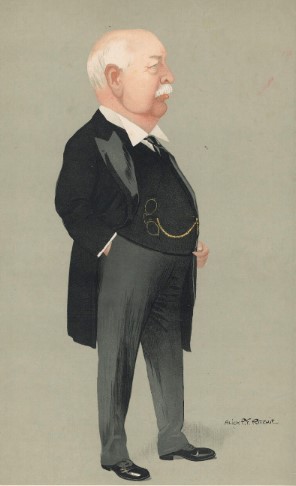Charles Wright Macara facts for kids
Quick facts for kids
Sir Charles Wright Macara
|
|
|---|---|

Macara depicted in Vanity Fair by Alick Ritchie, 1912
|
|
| Born | 11 January 1845 Strathmiglo, Fife
|
| Died | 2 January 1929 (aged 83) |
| Burial place | St Annes Parish Churchyard, Lytham St Annes, Lancashire |
| Nationality | Scottish |
| Citizenship | British |
| Occupation | Cotton spinner Textile merchant |
| Known for | Lifeboat Saturday Movement |
Sir Charles Wright Macara (born 1845, died 1929) was an important British businessman. He was known as a cotton spinner and textile industrialist. This means he owned and managed factories that made cloth from cotton.
Contents
Who Was Charles Macara?
Early Life and Education
Charles Macara was born in a place called Strathmiglo in Scotland on January 11, 1845. His father, William Macara, was a minister. Charles received his education privately and later in Edinburgh.
In 1862, he started working in Manchester, a big city in England. By 1880, he became the chairman and managing director of a large company called Henry Bannerman & Sons. This company made and sold cotton textiles.
Helping Others: The Lifeboat Saturday Movement
Charles Macara was very inspired to help people after a terrible accident. This was the Southport and St Anne's lifeboats disaster, where many lifeboat crew members died. In 1891, he started the Lifeboat Saturday Movement. This movement worked with the Royal National Lifeboat Institution (RNLI). Its goal was to raise money for the families of drowned sailors.
His wife, Marion Macara, also helped a lot. She started the Ladies Lifeboat Guild. Charles led the Lifeboat Saturday Movement across the United Kingdom until 1896.
The very first Lifeboat Saturday event was held in Manchester. It raised over £5,000, which was a lot of money back then! The event included a parade with bands, decorated floats, and even real lifeboats. This was the first time a charity had collected money on the streets in this way. Similar parades were later held in other cities. The Lifeboat Saturday Movement also used collecting boxes and organized door-to-door fundraising. It was the start of what we now know as the RNLI Flag Day.
Solving Problems in Factories
Charles Macara was also very good at solving problems between factory owners and workers. In 1892 and 1893, there were big disagreements in the cotton industry. Charles Macara played a key role in creating something called the Brooklands Agreement.
This agreement set up rules for how to solve future arguments peacefully. It became a model for how to settle disputes not just in the cotton industry, but in many other industries too.
Honors and Later Life
In 1911, Charles Macara was given a special title: he became a baronet. This means he was given the title "Sir." He also received many awards from other countries. These included the Chevalier de la Légion d'honneur from France and the Chevalier de l'Ordre de Léopold from Belgium.
Sir Charles Macara passed away in Cheshire, England, on January 2, 1929.
Family Life
| Charles Wright Macara | |
|---|---|
| Crest | A stag lodged reguardant in front of an oak tree Proper. |
| Blazon | Ermine an oak tree eradicated in bend dexter surmounted by a sword in bend sinister Proper hilt and pommel Or supporting on its point an imperial crown of the second on a chief of the third a spider Sable between two thistles also Proper. |
| Motto | Consilia Non Vi |
In January 1875, Charles Macara married Marion Young. Marion was a cousin of Sir Henry Campbell-Bannerman, who was also involved in the cotton business.
Sir Charles and Lady Marion Macara had two sons and four daughters. Their oldest son, William Cowper Macara, inherited his father's title.
See also
- Macara baronets
 | Kyle Baker |
 | Joseph Yoakum |
 | Laura Wheeler Waring |
 | Henry Ossawa Tanner |

